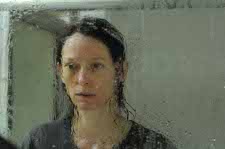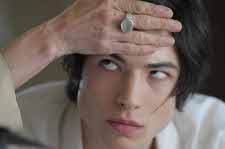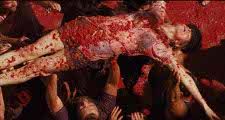
Tilda Swinton in We Need To Talk About Kevin
Adapted from the best selling novel by Lionel Shriver, We Need To Talk About Kevin is the story of a mother at odds with a son who will grow up to become a killer. Director Lynne Ramsay and star Ezra Miller, who plays the eponymous Kevin in his teens, came to the GFT in Lynne's native Glasgow to talk to fans about making the film.
The role of Kevin is Miller's most high-profile work so far, so how did he get the part? He laughs. “Lynne had the army of American actor boys saying 'We all wanna kill people!'”
“So I chose you,” says Lynne, smiling.
Was it difficult to get into the part?
“I imagine it would be a bit of challenge if you began the film as a sane person,” Ezra jokes. “It was a little hard and a little harrowing, for sure, but fortunately I have a very kind mother. I refused to talk to her – I couldn't really talk to anyone – while I was making this movie, but then the day after I'd finished I was talking with Rory [Kinnear, Lynne's husband] in the backyard of their house and Rory mentioned my mother and it was like 'Oh my god, my mother! My awesome, kind, understanding mother! So I ran to her and hid in her comfort for a while. I shook it off. I travelled a bunch and I went to a lot of warm places and reminded myself I am not like a serial killer. It's good to wake up from a nightmare.”
Lynne is openly ambiguous about the character. “One thing I liked in the novel was that at times I quite liked Kevin – well, not liked him, but, you know, saw him as the more honest one who told it like it was, saying this is bullshit, you know?”
She acknowledges that Kevin's mother Eva, played in the film by Tilda Swinton, is an unreliable narrator. “It's up for interpretation, but for me Eva felt like a resentful mother. That doesn't mean that because you feel that way you're going to bear a psychopath or a sociopath or whatever but I think definitely a child picks up on the feelings and the emotions of their mother at a very early stage. That's a proven fact when it comes to language. If you don't learn language before you're five, feral children won't ever learn to speak. If a mum feels uncomfortable with a baby, the baby picks that up. The way Tilda held that baby made that baby cry, actually; the baby felt uncomfortable because she felt uncomfortable.”
Lynne is quick to add that Tilda herself is a wonderful mother who couldn't be present for this discussion because she was busy doing birthday things with her 14-year-old twins.
“Nature and nurture is one of the oldest arguments in philosophy,” says Ezra. “I just don't see where one ends and the other begins.”

It would be fascinating to tell the story again from Kevin and Franklin (his father)'s perspectives, Lynne says. “Kevin's would be very different. I thought it was important to show just a tiny bit of unreliability sometimes. There's that teenage bravado too where everything's so extreme and you think you're invincible and immortal. I remember I was a bit of a goth teenager and everything was so dramatic at that point I probably drove my mum completely insane. I loved the answer that he didn't know why. Everyone's looking for an answer in this film and sometimes there just is no answer.
“This was a hard film to make. There weren't a lot of reference points. People suggest Rosemary's Baby and that's an interesting film because it's about fear but it's also supernatural and that's an easier pill to swallow.” She says there were few influences on the way she developed the story, but the work of Ingmar Bergman influenced her photography, particularly the idea of two people mirroring one another. “Eva sees herself as a monster reflected back at her.”
Telling a story set over 18 years must have been challenging too. “The starting point for me was that this is her present tense existence but we are also going back in time. Her life is pieces of this thing that's playing over again in her head. I also was trying to juggle other things: to keep suspense, to tell a good story. I'm a big fan of Mildred Pierce and films like that where you had female characters with quite strong, meaty stories, where they were still accessible films. There's black humour here and those odd moments of humour in the book made it richer. I was then trying to put myself in her shoes and thinking, how would my life be if it was like that?”
One of the routes Lynne used to work around the difficulty presented by such a long narrative was to employ a lot of symbolism, particularly in her use of the colour red.

“It had been so long since I made a film I was fit to burst, so I just burst all over with the red!” she laughs. “I think, going back to references, others for me would be would be Fifties films. I like Hitchcock and I like the way he uses colours psychologically. It was an economical way to move between time zones without a voice over. A lot of sounds were written in the script for the same reason, like the sprinkler noises. There's no violence in the film – you only see the aftermath – so the colour is an implication of violence. It's a bit Lady Macbeth, blood on your hands. Beyond that, sound was the connective tissue, and that's an element people don't notice, bringing you back to certain time frames and certain emotions and taking you somewhere atmospherically.”
As well as natural sound, the film has a painstakingly crafted score.
“What was really great for me was during post-production I sent out a rough cut and the response from the musicians was so positive. Aphex Twin emailed me and Jonny [Greenwood] I had thought was too busy with the Radiohead album but he was interested, he got back the next morning and said he was terrified by it and really wanted to do it. He's really shy and a really lovely guy. We had such a blast when I went down to his studio in Oxford and we got a wonderful classical musician from China, Liu Fang, who was recording with Jonny. She kept saying 'You're not recording me right!' - she didn't give a shit who Jonny Greenwood is, she just wanted it to sound right – so we had to say, we want it a bit rough. It was a fascinating experience.”
Watching a late night television programme about traditional Celtic music, Lynne was struck by the sound of a steel stringed harp, and as it emerged that Jonny's wife is a harpist they ended up incorporating one into the score. “It's a really strange sound,” Lynne notes, adding that it reminds her of that made by a bow and arrow. But she didn't want to create a soundtrack that was too moody and dark. “It felt more unsettling to make the music upbeat. But a lot of the songs we used were chain gang songs, originally sung by people with balls and chains around their feet, and that seemed appropriate because Eva has that too, in the form of this beast.”
She looks at Ezra, who laughs heartily. The two are plainly firm friends, and Lynne says that feeling extended to the whole cast.
“Considering the nature of the subject matter it was a very tight shoot, a very family-like shoot. My mother came round and cooked for everybody and John C Reilly was round every night playing the guitar. On the first night we were really excited that he was there and it was amazing, but after a couple of weeks we were, like 'Go home, John! We've had a 14-hour day and you were in one scene!' But it was great, and I think we really needed that because it was so dark and intense. We actually spent weekends together and that's something I've never done before on a shoot; normally you're running away from each other saying 'Please give me space'. So it was really special as a shoot for me.”

We Need To Talk About Kevin opens in cinemas across the UK this weekend.





















